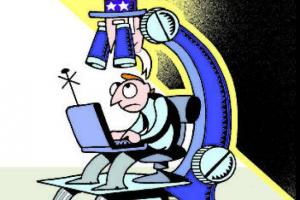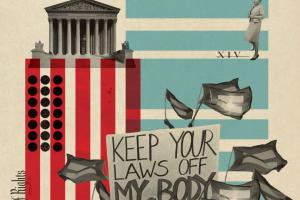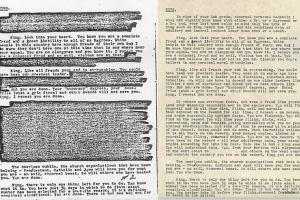How Robo-Callers Outwitted the Government and Completely Wrecked the Do Not Call List
The Washington Post
Plus, Seth takes a closer look at Trump and the GOP's plan to allow Internet companies to sell people's Internet data.
 (Fair warning: some of these are fairly wonky, so if you’re not the type that gets excited by telecom law, you can always skip to the part where you call your senators and representative and tell them not to repeal the FCC’s ISP privacy rules—because if we raise our voices together, we can stop Congress before it’s too late.)
(Fair warning: some of these are fairly wonky, so if you’re not the type that gets excited by telecom law, you can always skip to the part where you call your senators and representative and tell them not to repeal the FCC’s ISP privacy rules—because if we raise our voices together, we can stop Congress before it’s too late.)
 We live digital lives—from the videos shared on social networks, to location-aware apps on mobile phones, to log-in data for connecting to our email, to our stored documents, to our search history. The personal, the profound, and even the absurd are all transcribed into data packets, whizzing through the fiber-optic arteries of the network. Our daily lives have upgraded to the 21st century, but law and the practice of the private sector don't offer adequate protections.
We live digital lives—from the videos shared on social networks, to location-aware apps on mobile phones, to log-in data for connecting to our email, to our stored documents, to our search history. The personal, the profound, and even the absurd are all transcribed into data packets, whizzing through the fiber-optic arteries of the network. Our daily lives have upgraded to the 21st century, but law and the practice of the private sector don't offer adequate protections.
 There is a lesson in the past fifty years of litigation. When the fight for equal rights for women narrowed to a fight for reproductive rights, defended on the ground of privacy, it weakened. But when the fight for gay rights became a fight for same-sex marriage, asserted on the ground of equality, it got stronger and stronger.
There is a lesson in the past fifty years of litigation. When the fight for equal rights for women narrowed to a fight for reproductive rights, defended on the ground of privacy, it weakened. But when the fight for gay rights became a fight for same-sex marriage, asserted on the ground of equality, it got stronger and stronger.
 Even if it were true that cell phone users “voluntarily” disclose their location, it strains credulity to argue that, simply by virtue of putting a cell phone in their pocket, they voluntarily disclose “a wealth of detail about their familial, political, professional, religious, and sexual associations.”
Even if it were true that cell phone users “voluntarily” disclose their location, it strains credulity to argue that, simply by virtue of putting a cell phone in their pocket, they voluntarily disclose “a wealth of detail about their familial, political, professional, religious, and sexual associations.”
 “I don’t believe that law enforcement has an absolute right to gain access to every way in which two people may choose to communicate,” said Marc Zwillinger, “And I don’t think our Founding Fathers would think so, either. The fact that the Constitution offers a process for obtaining a search warrant where there is probable cause is not support for the notion that it should be illegal to make an unbreakable lock. These are two distinct concepts.”
“I don’t believe that law enforcement has an absolute right to gain access to every way in which two people may choose to communicate,” said Marc Zwillinger, “And I don’t think our Founding Fathers would think so, either. The fact that the Constitution offers a process for obtaining a search warrant where there is probable cause is not support for the notion that it should be illegal to make an unbreakable lock. These are two distinct concepts.”
 Should intelligence agencies be able to sweep email, read texts, track calls, locate us by GPS? Much of the conversation swirls around the possibility that agencies like the N.S.A. or the F.B.I. will use such information not to serve national security but to carry out personal and political vendettas. King’s experience reminds us that these are far from idle fears, conjured in the fevered minds of civil libertarians. They are based in the hard facts of history.
Should intelligence agencies be able to sweep email, read texts, track calls, locate us by GPS? Much of the conversation swirls around the possibility that agencies like the N.S.A. or the F.B.I. will use such information not to serve national security but to carry out personal and political vendettas. King’s experience reminds us that these are far from idle fears, conjured in the fevered minds of civil libertarians. They are based in the hard facts of history.
Spread the word